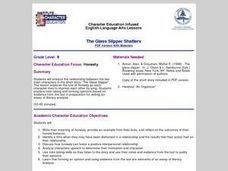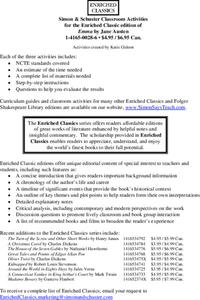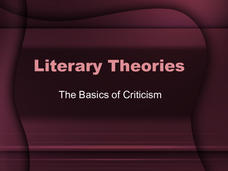K20 LEARN
Growing Themes
The theme of a work is not a single word! Rather it is a statement that reflects what a writer believes or wants readers to understand about a topic or subject. Here's a short, but powerful lesson that utilizes passages from The...
K20 LEARN
Criminal Motivations: Irony and Characterization In "The Cask Of Amontillado"
Edgar Allan Poe's short story "The Cask of Amontillado" is a bit of a puzzle. Critics have long debated Montresor's motives for killing Fortunato. Young scholars examine examples of the three types of irony (verbal, dramatic, and...
K20 LEARN
Between The Lines: Inferences In The Narrative Life Of Frederick Douglass Excerpt
Good literature can be much like an iceberg requiring readers to presume that the bulk of the meaning may be inferred to be found below the surface. Here's a lesson that asks scholars to conduct a close reading of passages from The...
K20 LEARN
Arguing With Evidence: Deconstructing Arguments Part 1
In the first lesson in a two-part series, high schoolers pick a social issue important to them and examine an article about the topic, the arguments and evidence used to support the writer's stance, and craft two counter-arguments to the...
K20 LEARN
"The Lady, Or The Tiger?" Which Do You Choose?: Internal and External Conflict
"How come there's no ending?" After a close reading of Frank R. Stockton's tale "The Lady, or the Tiger?" in which scholars examine each of the main characters' conflicts and motivations, writers craft their own ending using textual...
Orange County Department of Education
The Glass Slipper Shatters
High school freshmen craft their own definition of honesty. They provide an example from their lives and reflect on the outcomes of their honest behavior. They also identify a time when they may have been dishonest in a relationship and...
Trinity University
Introduction to Poetry
Introduce fourth graders to poetry with a three-week unit that has them examine the structural elements of poetry, analyze poems, and craft their own original poems rich in sensory details and other poetic devices. Young scholars study...
National Endowment for the Humanities
Magical Elements in Magical Realism
How does Gabriel Garcia Marquez make the magical elements of his novel appear so real? That's the challenge facing readers of One Hundred Years of Solitude. Scholars examine the tone and descriptive details Garcia Marquez uses to...
National Endowment for the Humanities
The Metamorphoses and Modern Poetry: A Comparison of Mythic Characters
To gain an appreciation of the power of point of view, class members compare Ovid's version of the myth of "Orpheus and Eurydice" with that used by H.D. in her poem, "Eurydice." Individuals then craft a reflection in which they use...
National Endowment for the Humanities
“The Great Migration” by Minnie Bruce Pratt
Minnie Bruce Pratt's poem, "The Great Migration," offers young scholars an opportunity to reflect on how where we come from influences who we are. Groups conduct a close reading of the poem, recording observations about the poem's...
National Endowment for the Humanities
“Every Day We Get More Illegal” by Juan Felipe Herrera
A study of Jan Felipe Herrera's poem "Every Day We Get More Illegal" opens the door for a discussion on immigration. To begin, class members examine the photograph "Desert Survival," record their observations of the image, and then...
National Endowment for the Humanities
The Glass Menagerie: Impact of Expressionism
Young scholars are challenged to write a realistic analysis of Tennessee Williams' nonrealistic memory play, The Glass Menagerie. Writers use the evidence gathered on their worksheets to craft an effective thesis and concluding statement...
National Endowment for the Humanities
The Glass Menagerie as Expressionist Theatre
The first lesson in a three-part unit has high schoolers examine The Glass Menagerie as an example of expressionist theatre. After reading a short article about expressionism, scholars list expressionist techniques in Tennessee...
National Endowment for the Humanities
Societal Schisms and Divisions
The final lesson in the Crime and Punishment unit looks at the societal injustices depicted in Dostoyevsky's novel. Scholars examine the schisms between men and women, between wealth and poverty, between religion and skepticism, and...
National Endowment for the Humanities
Themes in Lord of the Flies
William Golding's Lord of the Flies is the anchor text for a lesson that teaches readers how to distinguish between a literary topic and a literary theme. Using the provided worksheets, groups first chart some themes and propose a...
National Endowment for the Humanities
Characterization in Lord of the Flies
Readers of Lord of the Flies hunt down direct and indirect examples of how William Golding brings his characters to life. After instructors guide learners through the process of collecting evidence of these two types of...
National Endowment for the Humanities
Symbolism in Lord of the Flies
Readers of Lord of the Flies examine the four main symbols William Golding develops in his novel: the island, the conch, the Lord of the Flies effigy, and fire. Partners select one of the major symbols and create an image by adding words...
National Endowment for the Humanities
Edgar Allan Poe, Ambrose Bierce, and the Unreliable Narrator
Stories by Edgar Allan Poe and Ambrose Bierce provide readers with an opportunity to investigate unreliable narrators. The lesson plan begins with an activity about different types of point of view and continues as scholars apply their...
Academy of American Poets
Teach This Poem: "Imagine" by Kamilah Aisha Moon
A instructional activity about Kamilah Aisha Moon's poem "Imagine" asks young scholars to imagine, "What would happen if...?" If Dr. Martin Luther King's dream became a reality. If Renisha McBride was a white girl and crashed her car in...
Simon & Schuster
Classroom Activities for Emma by Jane Austen
Coldhearted snob or warm and caring? A series of activities prepares scholars to evaluate the main character in Jane Austen's Emma. To begin, class members compare the gender expectations for women in Regency England and those of today....
Simon & Schuster
Classroom Activities for Ethan Frome by Edith Wharton
Edith Wharton's Ethan Frome is the focus of an 11-page packet that includes three lesson plans, three worksheets, and a homework assignment. The first lesson introduces readers to the historical context of the novel. At the same time,...
Livaudais-Baker English Classroom
Literary Theories
Introduce ELA scholars to the basics of literary criticism with a 41-slide presentation that identifies eight different approaches to critical analysis. Each approach is defined, and advantages and disadvantages are listed. Also included...
EngageNY
Organizing an Opinion, Reasons, and Evidence: Expert Group Text 3
Let's race to the finish line. Scholars read an informational text about a chosen athlete. While reading, they add evidence and reasons to a graphic organizer to support their opinions about how their athlete broke barriers.
EngageNY
Mid-Unit Assessment: Identifying Author’s Opinion, Reasons, and Supporting Evidence: “Courage on the Field”
What do you think? Scholars complete a mid-unit assessment in which they identify an opinion in Courage on the Field along with evidence that supports it. After the assessment, pupils complete Tracking My Progress, Mid-Unit 2...

























